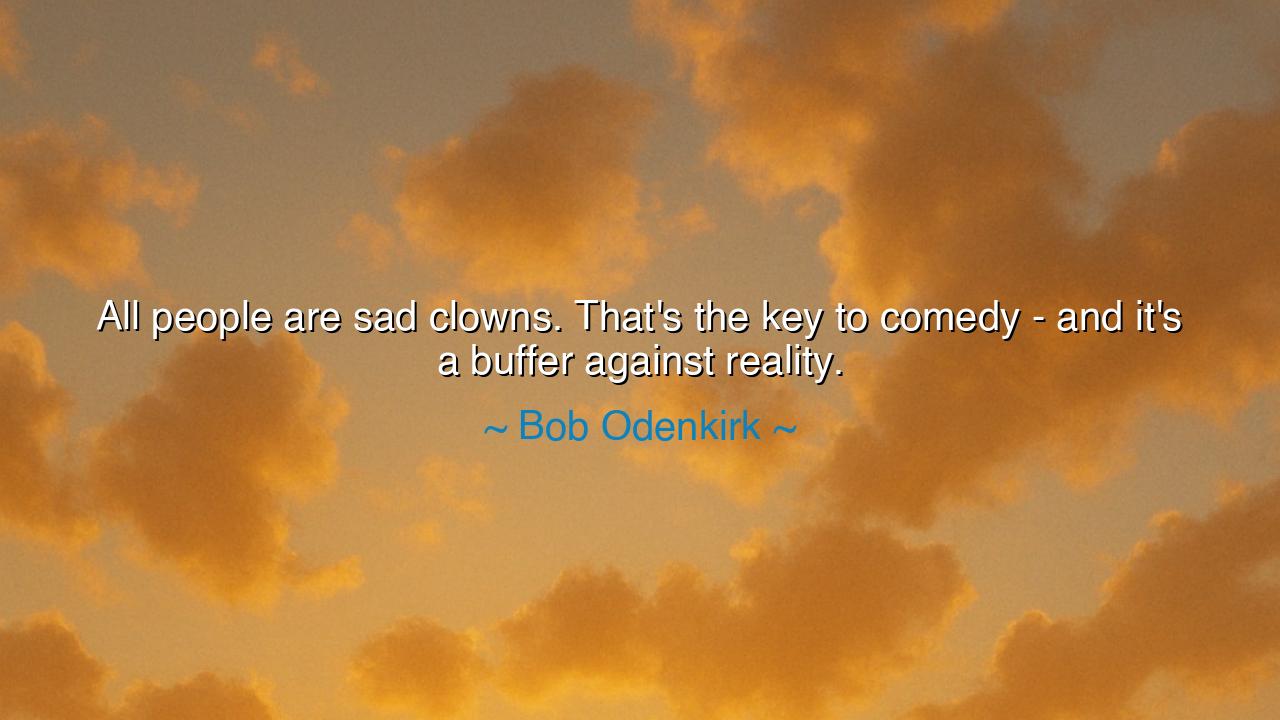
All people are sad clowns. That's the key to comedy - and it's a
All people are sad clowns. That's the key to comedy - and it's a buffer against reality.






The words of Bob Odenkirk, “All people are sad clowns. That’s the key to comedy — and it’s a buffer against reality,” reveal one of the deepest paradoxes of the human spirit — that laughter and sorrow are not opposites, but twins born of the same heart. In these few lines, Odenkirk, an artist who has walked the fine line between tragedy and humor, unveils a truth that has echoed through every age: that mankind hides its pain behind masks, and in doing so, transforms suffering into something bearable — even beautiful. The sad clown is not merely a performer’s image; it is a symbol of our shared condition, the eternal dance between grief and grace that defines what it means to be human.
In ancient times, the wise already knew this. The Greeks called it catharsis — the cleansing of emotion through art and performance. Their comedies and tragedies were not divided by tone, but by focus: both sought to reveal the hidden anguish beneath the surface of joy, the laughter that follows tears. The mask of comedy, with its frozen smile, and the mask of tragedy, with its weeping eyes, were carved from the same stone. Odenkirk’s insight is their modern echo. He reminds us that humor does not deny pain; it redeems it. The clown laughs not because he is free of sorrow, but because laughter is the only weapon that can turn sorrow into survival.
To call all people “sad clowns” is not cynicism — it is compassion. It is the recognition that every heart carries burdens unseen, that every smile may conceal a silent battle. Odenkirk, a man who has given the world both comedy and tragedy through his performances, speaks as one who has seen how laughter can shield the soul. When he says comedy is a “buffer against reality,” he does not mean it is escape, but armor — a way to stand against the absurdity of existence without breaking beneath its weight. The clown’s makeup, the joke, the performance — these are not deceptions; they are rituals of endurance.
There is a story told of the great Italian clown Pagliacci. A man once went to a doctor and said, “I am unhappy; life feels gray and meaningless.” The doctor smiled and said, “You should go see Pagliacci perform — he will make you laugh.” The man lowered his head and replied, “But doctor, I am Pagliacci.” This ancient parable captures the essence of Odenkirk’s words: that those who make others laugh are often the ones who carry the deepest pain. Yet their gift is not hypocrisy — it is heroism. They choose to share laughter as a light in the dark, even while the shadows remain within them.
Throughout history, the clown archetype has always been sacred. In royal courts, jesters spoke truth through humor, softening harsh realities that others dared not utter. In this way, laughter became not frivolity, but wisdom disguised in jest. The fool, the trickster, the comic — these figures remind us that even in sorrow, the soul can dance. Odenkirk, like the jesters of old, reminds us that to laugh is not to forget reality, but to face it with courage. Comedy becomes the mirror of pain that reflects endurance instead of despair.
Even in the life of Odenkirk himself, this truth takes flesh. Known for his comedic genius on shows like Mr. Show, he later revealed the depth of his humanity through dramatic roles, where humor and heartbreak intertwined. His career is a testament to this duality — that the laughter we share is born from the recognition of our shared fragility. Every joke, every punchline, every moment of absurdity is a rebellion against despair. It is the soul’s refusal to surrender to the darkness that surrounds it.
The lesson, then, is timeless: do not be ashamed of the mask you wear, nor of the sorrow behind it. The human heart must sometimes hide its wounds beneath laughter to keep beating. When you laugh, let it be both release and remembrance — a celebration of survival, not denial. And when you see another smile, remember that behind it may live a story of pain, endurance, and grace. Approach others with gentleness, for we are all sad clowns, stumbling through the circus of life, painted with tears and laughter alike. Yet it is precisely this mixture — this union of tragedy and humor — that makes us not pitiful, but profoundly, beautifully human.






AAdministratorAdministrator
Welcome, honored guests. Please leave a comment, we will respond soon